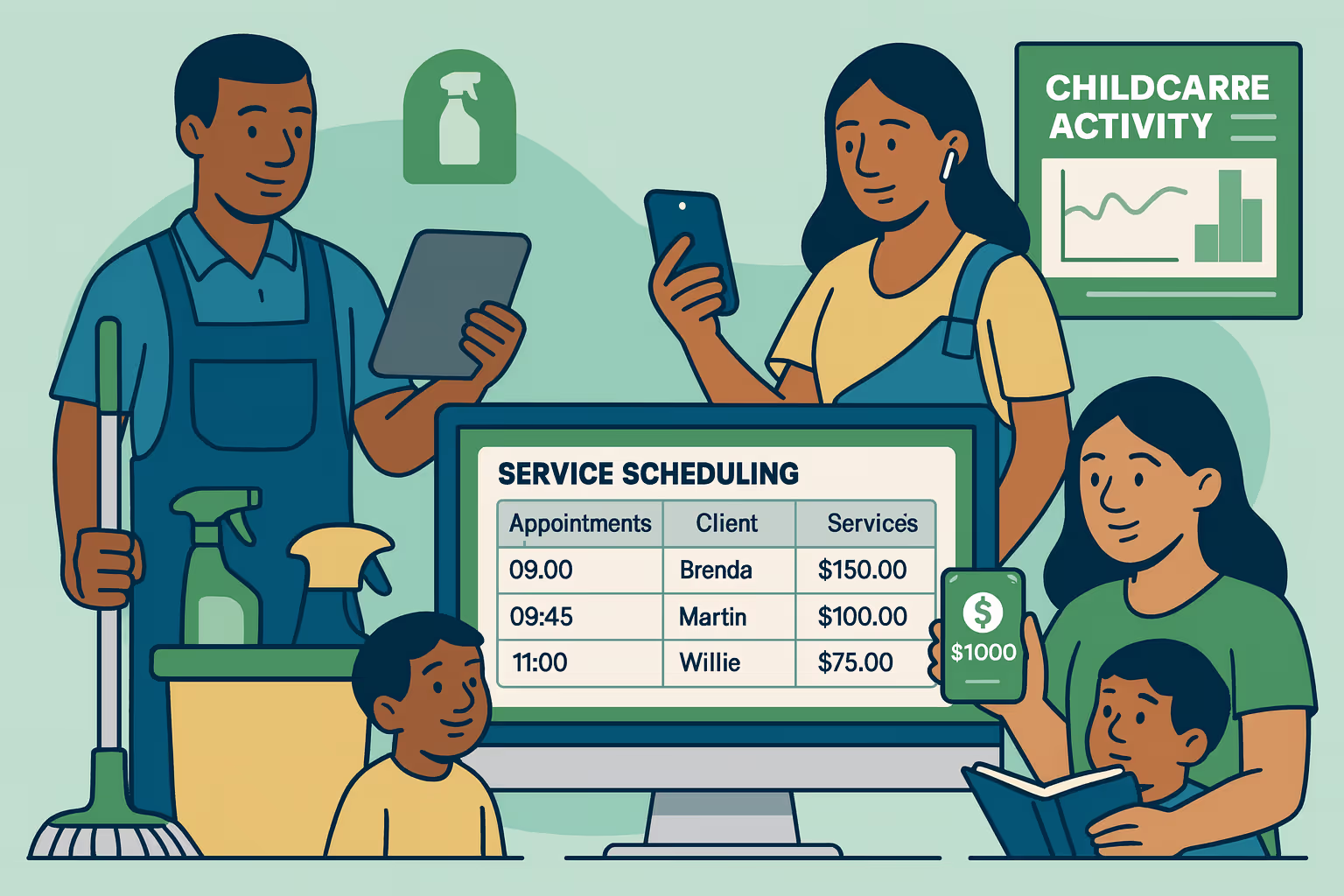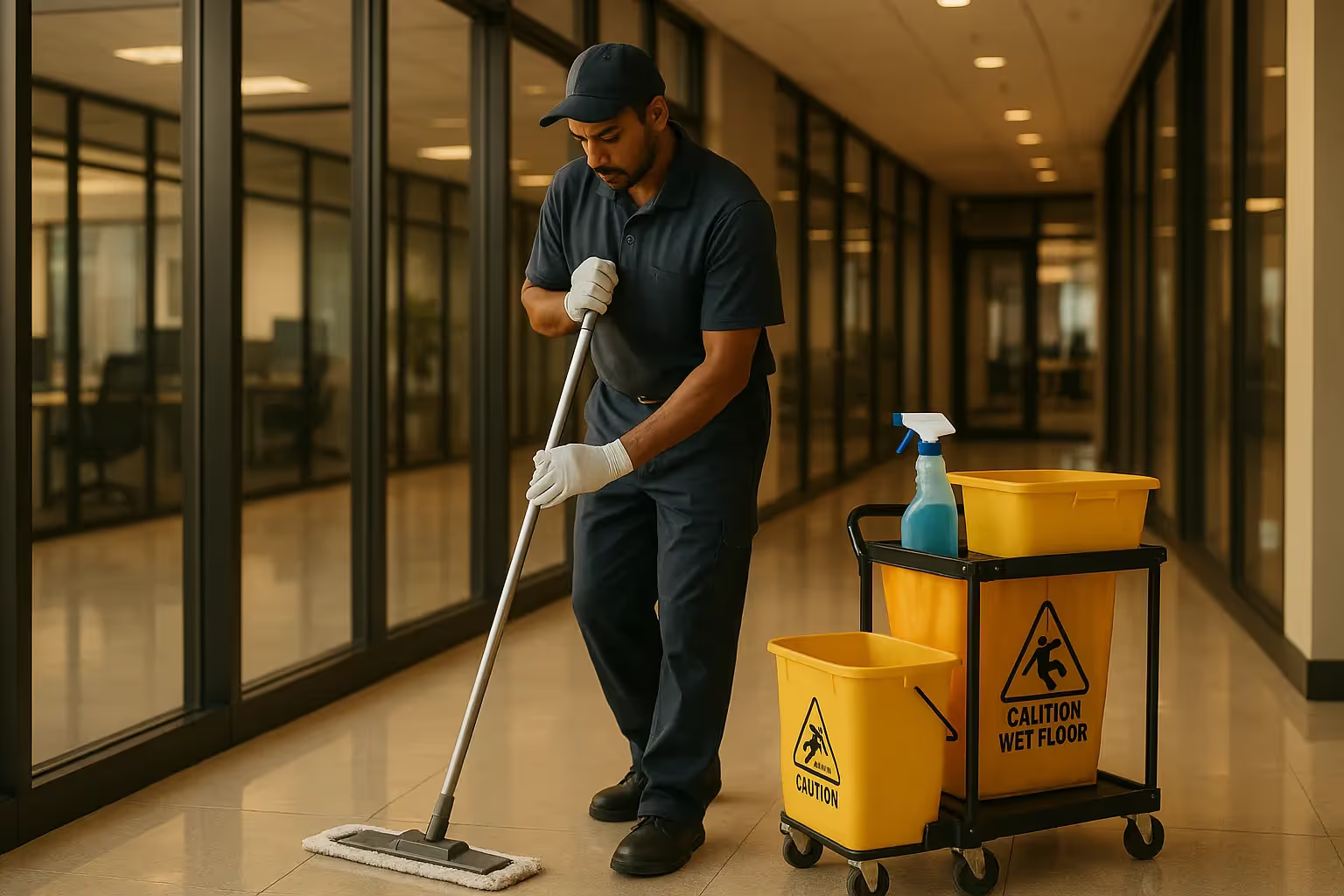
Conserjes, limpiadores de casas y proveedores de guarderías
Introducción
Los conserjes, limpiadores de casas y proveedores de guarderías apoyan la vida diaria al mantener los espacios limpios, seguros y acogedores para los demás. Sus contribuciones fortalecen los hogares, las empresas y las comunidades, creando entornos en los que las personas prosperan. Sin sus esfuerzos, los servicios esenciales como el saneamiento y el cuidado infantil se enfrentarían a importantes interrupciones. Su trabajo conlleva tanto un valor social como una responsabilidad financiera.
Muchas personas que desempeñan estas funciones suelen recibir ingresos a través de trabajos a tiempo parcial, pequeños trabajos o pagos directos en efectivo de los clientes. Esta estructura de pagos crea dificultades a la hora de documentar las ganancias para pagar impuestos y planificar financieramente a largo plazo. Los trabajadores que no llevan registros precisos pueden tener dificultades para cumplir con las normas. Estos desafíos hacen que la administración financiera proactiva sea aún más importante.
El IRS aplica estrictas normas tributarias que exigen que se declaren todos los ingresos, independientemente del método o la frecuencia de pago. Ignorar estas reglas puede provocar auditorías, conllevar sanciones importantes y poner en peligro la elegibilidad para recibir beneficios futuros. Los trabajadores deben entender si están clasificados como empleados, contratistas o propietarios de negocios. La clasificación correcta les ayuda a cumplir con las obligaciones legales y, al mismo tiempo, a proteger la seguridad financiera a largo plazo.
Comprender a los conserjes, limpiadores de casas y proveedores de guarderías en términos fiscales y el cumplimiento tributario de los conserjes
Las obligaciones tributarias de los conserjes, limpiadores de casas y proveedores de guarderías pueden ser complejas, especialmente cuando los ingresos provienen de múltiples fuentes. Comprender el cumplimiento tributario garantiza que los ingresos se declaren correctamente y que las deducciones se maximicen en virtud de las leyes tributarias federales y estatales. A continuación se detallan las áreas clave que afectan directamente a la salud financiera y a la correcta presentación de informes tributarios.
Clasificación de ingresos y obligaciones tributarias
- Estado del empleado: Los trabajadores clasificados como empleados deben declarar los salarios pagados y retener los impuestos laborales, incluidos los impuestos del Seguro Social y Medicare.
- Reglas para empleados domésticos: Las familias que contraten proveedores de cuidado infantil a domicilio deben cumplir con los requisitos tributarios para niñeras y presentar los formularios del IRS correspondientes.
- Estatus de trabajador autónomo: Los trabajadores independientes deben pagar impuestos sobre la renta y el trabajo por cuenta propia sobre todos los ingresos imponibles obtenidos por los servicios.
- Informes de ingresos comerciales: Los propietarios de empresas de limpieza deben llevar un registro de los ingresos por separado y presentar las declaraciones de impuestos según las normas para propietarios de pequeñas empresas.
Deducciones fiscales y gastos deducibles
- Gastos empresariales: Los servicios de limpieza pueden deducir gastos como los suministros de limpieza, el equipo y los servicios profesionales.
- Gastos del vehículo: Los trabajadores pueden deducir los gastos del automóvil, las tarifas de estacionamiento y los gastos reales relacionados con los viajes para las operaciones comerciales.
- Deducción por oficina en casa: Quienes dirijan un negocio de limpieza o una guardería desde su casa pueden reclamar los gastos de oficina en casa o una deducción por oficina en casa.
- Contribuciones caritativas: Las donaciones realizadas durante el año tributario pueden ser deducibles de impuestos si se mantienen los registros financieros y los recibos adecuados.
Créditos y reducciones en la obligación tributaria
- Crédito por cuidado de dependientes: Los proveedores de guarderías pueden ayudar a los clientes a solicitar el crédito por cuidado de dependientes y, al mismo tiempo, comprender su impacto en el cumplimiento tributario.
- Créditos tributarios: Los trabajadores elegibles pueden solicitar créditos tributarios para reducir su obligación tributaria durante la temporada de impuestos.
- Gastos médicos: Los gastos médicos deducibles y las primas del seguro médico pueden reducir los ingresos imponibles de los propietarios de pequeñas empresas.
- Intereses hipotecarios e impuestos inmobiliarios: Los proveedores domiciliarios pueden deducir los intereses hipotecarios y los impuestos inmobiliarios al declarar los impuestos.
Soporte profesional y registros precisos
- Asistencia de expertos en impuestos: La contratación de un profesional de impuestos o un preparador de impuestos puede garantizar el cumplimiento del código tributario y maximizar las deducciones.
- Registros precisos: Los trabajadores deben llevar un registro de los gastos, los salarios, los pagos de arrendamiento y las tasas de registro para respaldar sus declaraciones de impuestos.
- Herramientas de preparación de impuestos: Un preparador de impuestos o un software pueden simplificar la presentación de impuestos, especialmente si se trata de varios gastos relacionados con la empresa.
- Garantía de cumplimiento: Un experto en impuestos ayuda a los propietarios de negocios a mantenerse actualizados sobre las regulaciones tributarias y las obligaciones tributarias específicas en virtud del código tributario.
El cumplimiento tributario protege la salud financiera a largo plazo de los conserjes, limpiadores de casas y proveedores de guarderías al reducir el riesgo y maximizar los beneficios permitidos. Estos trabajadores esenciales pueden proteger sus ingresos y su estabilidad siguiendo las regulaciones tributarias, haciendo un seguimiento de los gastos y utilizando servicios profesionales.
Tipos de situaciones tributarias y de cumplimiento, incluidos los impuestos a los empleados domésticos y al empleo
Dependiendo de su acuerdo de trabajo, diferentes situaciones tributarias y de cumplimiento afectan a los conserjes, limpiadores de casas y proveedores de guarderías. Cada puesto conlleva obligaciones tributarias únicas según las regulaciones del IRS, y entenderlas garantiza una presentación adecuada y una buena salud financiera. Estas son las principales clasificaciones con sus responsabilidades tributarias específicas.
- Empleado (trabajador W-2): Los empleadores retienen los impuestos sobre la renta, el Seguro Social y Medicare directamente de los salarios pagados durante el año tributario.
- Beneficios para empleados: Los trabajadores pueden reunir los requisitos para recibir la cobertura tributaria por desempleo, la compensación laboral o las protecciones tributarias federales por desempleo.
- Ejemplo de conserje: Un conserje empleado por un distrito escolar debe confiar en registros precisos para las declaraciones de impuestos durante la temporada de impuestos.
- Contratista independiente (1099 trabajadores): Los contratistas deben pagar impuestos sobre la renta e impuestos sobre el trabajo por cuenta propia sobre los ingresos imponibles obtenidos de los servicios de limpieza.
- Gastos deducibles: Los trabajadores pueden reclamar los gastos del vehículo, los gastos del automóvil, las tarifas de estacionamiento, los artículos de limpieza y otros gastos.
- Ejemplo de limpiador de casas: Un limpiador de casas que presta servicios de limpieza del hogar a varias familias administra de forma independiente los ingresos comerciales y los gastos deducibles.
- Empleada doméstica (trabajadora doméstica): Las familias que contratan a cuidadores o limpiadores deben cumplir con las leyes tributarias que exigen impuestos a las niñeras y presentar Formularios del IRS.
- Responsabilidades del empleador: Los empleadores deben gestionar los impuestos sobre el empleo, la seguridad social y Medicare, y emitir los formularios W-2 en la fecha límite para presentar la declaración de impuestos.
- Ejemplo de proveedor de guardería: Los padres que contratan a un proveedor de guarderías a domicilio asumen la responsabilidad de cumplir con las normas tributarias para los empleados domésticos.
- Dueño de una pequeña empresa (LLC o propietario único): Los propietarios de empresas de limpieza y los operadores de guarderías deben gestionar el cumplimiento tributario de todas las operaciones comerciales.
- Gastos relacionados con la empresa: Los gastos deducibles pueden incluir intereses hipotecarios, impuestos sobre bienes inmuebles, primas de seguro médico, una deducción por oficina en casa y pagos de arrendamiento.
- Ejemplo de negocio de limpieza: Los propietarios de pequeñas empresas que ofrecen servicios de limpieza con personal deben hacer un seguimiento de los gastos, maximizar las deducciones y mantener registros financieros para la preparación de impuestos.
Reconocer si es empleado, contratista independiente, empleado doméstico o propietario de una pequeña empresa determina sus obligaciones tributarias específicas. Si comprende estas categorías y trabaja con un profesional tributario o un preparador de impuestos, puede presentar declaraciones de impuestos precisas, reducir su obligación tributaria y proteger su salud financiera.
Por qué abordar los impuestos es fundamental para los impuestos sobre el trabajo por cuenta propia, los impuestos sobre las niñeras y los formularios del IRS
Es fundamental abordar los impuestos porque los ingresos no declarados pueden generar rápidamente multas e intereses del IRS que dañan la estabilidad financiera. La presentación precisa de los formularios del IRS garantiza el cumplimiento de las normas tributarias y evita las estresantes auditorías que interrumpen las operaciones diarias. Los impuestos sobre el trabajo por cuenta propia respaldan directamente los beneficios del Seguro Social y Medicare, de los que dependen los trabajadores durante la jubilación. Ignorar estas obligaciones crea riesgos a largo plazo que superan la conveniencia a corto plazo.
Los impuestos a las niñeras son igualmente importantes porque los empleadores domésticos se enfrentan a problemas legales si no declaran los salarios pagados correctamente. El pago de los impuestos laborales garantiza los beneficios para los trabajadores y demuestra el cumplimiento de las leyes tributarias federales y estatales. Las declaraciones de impuestos precisas para niñeras protegen a las familias de las multas y ayudan a los cuidadores a acceder a la cobertura del Seguro Social y Medicare. El cumplimiento genera confianza y garantiza la protección legal para todos los involucrados.
El mantenimiento de registros adecuado permite reclamar deducciones como gastos de oficina en casa, gastos de vehículos y otros gastos relacionados con el negocio. Los registros financieros organizados permiten a los propietarios de pequeñas empresas maximizar las deducciones y reducir los ingresos imponibles totales cada año tributario. La declaración de impuestos con la documentación completa refuerza la credibilidad y ayuda a garantizar el financiamiento o los préstamos para el crecimiento empresarial. Abordar los impuestos apoya plenamente la salud financiera y la estabilidad profesional a largo plazo.
Nuestro sencillo proceso de 4 pasos para la preparación y el cumplimiento de impuestos
Nuestro proceso de 4 pasos facilita la preparación y el cumplimiento de los impuestos para los conserjes, limpiadores de casas y proveedores de guarderías. Cada paso reduce el estrés, aborda las obligaciones tributarias y protege la salud financiera. Así es como funciona el proceso en la práctica.
- Evaluación gratuita de casos: Realizamos una revisión confidencial de sus necesidades de preparación de impuestos e identificamos los riesgos en el cumplimiento tributario de los conserjes.
- Identificación de riesgos: Descubrimos posibles problemas relacionados con las solicitudes de guarderías, las normas de los empleados domésticos o los impuestos laborales que pueden afectar su situación.
- Análisis de elegibilidad y necesidades: Determinamos si debe clasificarse como empleado, contratista independiente o empleado doméstico.
- Enfoque personalizado: Combinamos su estado con el mejor plan de cumplimiento según las regulaciones tributarias del IRS y las obligaciones tributarias específicas.
- Preparación y presentación de documentos: Preparamos todos los formularios del IRS, incluidos los impuestos sobre el trabajo por cuenta propia, los impuestos sobre el empleo y las declaraciones de impuestos.
- Precisión de la deducción: Nos aseguramos de que los gastos de oficina central, vehículos y otros gastos deducibles se apliquen correctamente durante la presentación de impuestos.
- Soporte y actualizaciones continuos: Ayudamos a hacer un seguimiento de los gastos y a mantener registros precisos para respaldar futuras temporadas tributarias.
- Supervisión de la regulación: Supervisamos las regulaciones tributarias y ajustamos las declaraciones cuando es necesario para salvaguardar su cumplimiento y estabilidad financiera.
Al seguir este proceso, puede cumplir con sus obligaciones tributarias con confianza, reducir su obligación tributaria y mantener el cumplimiento año tras año.
Preguntas frecuentes
¿Cuáles son las responsabilidades tributarias?
Las responsabilidades tributarias incluyen declarar todos los ingresos, ya sean de salarios, trabajo por cuenta propia o ingresos comerciales. Si corresponde, los trabajadores deben pagar impuestos sobre la renta, impuestos sobre el trabajo por cuenta propia e impuestos sobre el empleo, como el Seguro Social y Medicare. Los empleadores domésticos deben retener y pagar los impuestos a las niñeras sobre los salarios pagados. Los propietarios de negocios también deben hacer un seguimiento de los gastos deducibles, recaudar el impuesto sobre las ventas cuando sea necesario y cumplir con los plazos de presentación de impuestos. El cumplimiento de estas responsabilidades garantiza el cumplimiento tributario, reduce la responsabilidad y protege la salud financiera contra auditorías o sanciones.
¿Quién reúne los requisitos o se ve afectado?
Los conserjes, limpiadores de casas y proveedores de guarderías se ven afectados por las obligaciones tributarias, independientemente de si trabajan a tiempo parcial, completo o por temporadas. Según las regulaciones tributarias del IRS, los empleados domésticos, los contratistas independientes y los propietarios de negocios de limpieza enfrentan diferentes responsabilidades. Las familias que contratan trabajadores domésticos también califican como empleadores con requisitos de presentación de impuestos. Cualquier persona que obtenga ingresos imponibles a través de servicios de limpieza, guarderías u operaciones comerciales relacionadas debe cumplir con las normas del IRS. Independientemente de la función, el cumplimiento adecuado protege la estabilidad financiera y la elegibilidad para recibir beneficios.
¿Cuánto dura el proceso?
El tiempo requerido depende de su situación. La presentación de impuestos para un solo año tributario suele tardar semanas si los registros están organizados. Resolver los impuestos atrasados, corregir los formularios del IRS o gestionar los impuestos laborales pendientes de pago puede llevar meses o más. Los casos complejos, como las auditorías o las disputas, pueden extender los plazos de manera significativa. Sin embargo, empezar pronto, mantener registros precisos y trabajar con un profesional o preparador de impuestos reduce las demoras. La presentación oportuna garantiza el cumplimiento de las normas tributarias y evita costosas sanciones o medidas coercitivas.
¿Qué documentos se requieren?
Los documentos esenciales incluyen los formularios W-2, 1099 o facturas que muestren los salarios pagados o los ingresos comerciales obtenidos. Los propietarios y contratistas de empresas de limpieza deben conservar los recibos de los artículos de limpieza, los gastos del vehículo, los pagos del arrendamiento y otros gastos deducibles. Los proveedores de guarderías suelen necesitar licencias de cuidado de niños, registros de los gastos de cuidado de niños y documentación sobre las deducciones por concepto de oficina en casa. Si corresponde, los contribuyentes también deben recopilar los estados de interés hipotecarios, las primas del seguro médico y las contribuciones caritativas. Los registros financieros precisos y los formularios del IRS proporcionan pruebas de cumplimiento y respaldan todas las deducciones o créditos reclamados.
¿Pueden obtener ayuda tanto las personas como las empresas?
Las personas y las empresas pueden recibir ayuda profesional para la preparación y el cumplimiento de los impuestos. Los conserjes independientes, los empleados domésticos y los proveedores de guarderías con frecuencia necesitan orientación sobre los impuestos sobre el trabajo por cuenta propia y los gastos deducibles. Las familias que contratan a cuidadores pueden necesitar ayuda para pagar los impuestos sobre las niñeras y los impuestos laborales y para presentar correctamente los formularios del IRS. Los propietarios de negocios de limpieza y los operadores de pequeñas empresas se benefician de las estrategias para maximizar las deducciones, administrar los ingresos comerciales y cumplir con las leyes tributarias. Los servicios profesionales garantizan la precisión de los registros, la presentación oportuna y la reducción del riesgo de sanciones.
¿Necesito ayuda profesional?
La ayuda profesional no es obligatoria, pero ofrece beneficios valiosos. Un profesional de impuestos o un preparador de impuestos garantiza el cumplimiento de los complejos códigos y reglamentos tributarios. Pueden identificar los créditos tributarios, aplicar deducciones por gastos comerciales y minimizar la obligación tributaria. Los profesionales también guían las obligaciones tributarias específicas de los empleados domésticos, los trabajadores autónomos y los propietarios de negocios. Si bien las personas pueden tramitar sus propias declaraciones, el asesoramiento de expertos ayuda a maximizar las deducciones, evitar errores y mantener registros precisos. El apoyo profesional protege la salud financiera a largo plazo.
¿Qué pasa si no hago nada?
Ignorar las responsabilidades tributarias puede tener graves consecuencias. El IRS puede imponer multas, intereses o embargos salariales por impuestos sobre la renta o el empleo no pagados. Los trabajadores por cuenta propia que evitan pagar impuestos sobre el trabajo por cuenta propia corren el riesgo de perder los beneficios futuros del Seguro Social y Medicare. Los empleadores domésticos pueden enfrentarse a problemas legales por no presentar correctamente los impuestos de niñera o los formularios del IRS. No presentar declaraciones de impuestos precisas también perjudica la credibilidad financiera, lo que dificulta la obtención de préstamos o viviendas. En última instancia, la inacción pone en peligro la estabilidad financiera y la seguridad futura.
Proteja sus ingresos y obtenga beneficios a largo plazo ahora
La protección de su futuro financiero comienza con el cumplimiento y la preparación precisa de impuestos que cumplan con las estrictas regulaciones tributarias del IRS todos los años. Obtenga una desgravación fiscal ahora brinda apoyo experto a conserjes, limpiadores de casas y proveedores de guarderías que enfrentan obligaciones tributarias complejas. Sus servicios incluyen revisar los registros financieros, garantizar las deducciones adecuadas y hacer un seguimiento de los gastos deducibles, como los costos de los vehículos y el uso de la oficina en casa. Con la ayuda de un profesional, puedes evitar las multas y tener la tranquilidad de tener una buena salud financiera a largo plazo.
Solicite una revisión gratuita de su caso hoy mismo para obtener asistencia confidencial y personalizada adaptada a su situación y operaciones comerciales únicas. Sus expertos en impuestos analizan los impuestos sobre el empleo, los impuestos sobre las niñeras y las declaraciones de trabajo por cuenta propia para crear un plan de cumplimiento personalizado. Los formularios precisos del IRS y las deducciones adecuadas ayudan a reducir la obligación tributaria y, al mismo tiempo, a maximizar los créditos disponibles para los trabajadores y propietarios de pequeñas empresas. Actúe ahora para fortalecer el cumplimiento, proteger los ingresos y salvaguardar los beneficios futuros trabajando con profesionales de confianza.




















